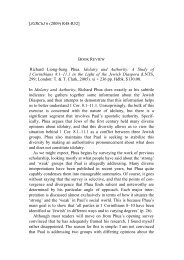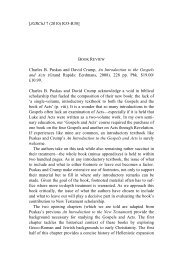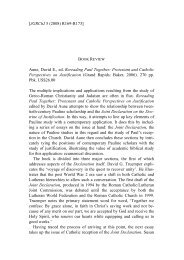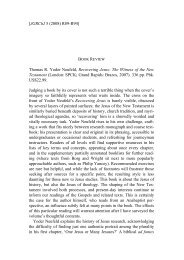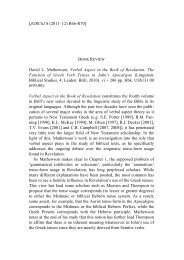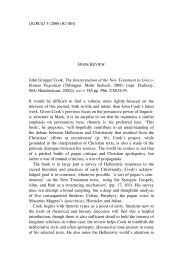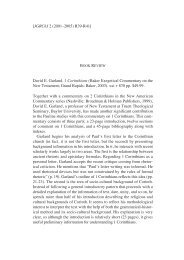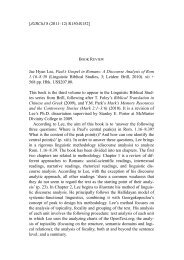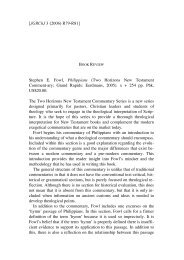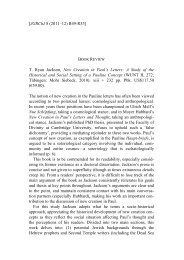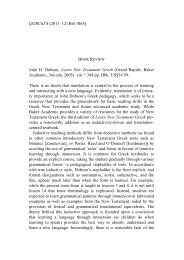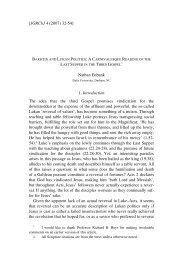The Politics of Ephesians and the Empire - Journal of Greco-Roman ...
The Politics of Ephesians and the Empire - Journal of Greco-Roman ...
The Politics of Ephesians and the Empire - Journal of Greco-Roman ...
You also want an ePaper? Increase the reach of your titles
YUMPU automatically turns print PDFs into web optimized ePapers that Google loves.
Gupta & Long <strong>Politics</strong> <strong>of</strong> <strong>Ephesians</strong> <strong>and</strong> <strong>the</strong> <strong>Empire</strong> 133<br />
himself up for her’. To this believing community, <strong>the</strong>re would be <strong>the</strong><br />
immediate recognition that Christ intentionally lowered himself <strong>and</strong><br />
bore great shame <strong>and</strong> humiliation on behalf <strong>of</strong> ‘<strong>the</strong> church’ (1.4-8; 2.12-<br />
14; 4.32–5.2; cf. Phil. 2.1-11). This Christ–church paradigm re-designs<br />
<strong>the</strong> husb<strong>and</strong>–wife relationship in a way that would have challenged<br />
traditional <strong>Greco</strong>-<strong>Roman</strong> social norms. 82<br />
Thirdly, in 6.9 <strong>the</strong> masters are comm<strong>and</strong>ed to ‘do <strong>the</strong> same things’<br />
to <strong>the</strong> slaves (ta\ au0ta\ poiei=te pro\j au0tou/j) as <strong>the</strong> slaves were<br />
comm<strong>and</strong>ed to do for <strong>the</strong> masters (6.5-8). This is absolutely stunning,<br />
for such would involve <strong>of</strong>fering service to Christ with sincerity <strong>of</strong> heart<br />
(6.5) as slaves <strong>of</strong> Christ doing God’s will (6.6), serving Christ with good<br />
will (6.7), <strong>and</strong> knowing that <strong>the</strong> Lord will give due recompense ‘to slave<br />
or freed person’ (6.8).<br />
It is easy to exaggerate, however, <strong>the</strong> radicality <strong>of</strong> <strong>the</strong> Christian HCs.<br />
From a practical perspective, <strong>the</strong> Christian household would apparently<br />
operate in a way similar to <strong>the</strong> secular one in <strong>the</strong> <strong>Empire</strong>. 83 This, essentially,<br />
is <strong>the</strong> point that Crossan <strong>and</strong> Reed are making regarding <strong>the</strong> approval <strong>of</strong><br />
Augustus <strong>of</strong> <strong>the</strong> HCs if <strong>the</strong> ‘Christian motivation’ was removed. However,<br />
when we treat <strong>the</strong> issue <strong>of</strong> ‘resistance’ versus ‘conformity’, we must take<br />
into account both deeds <strong>and</strong> words. Thus, it might be helpful to imagine<br />
Augustus’s reaction to <strong>the</strong> Ephesian HC as is. Several features <strong>of</strong> <strong>the</strong><br />
particularized Ephesian HC are striking. First, already explored above, is<br />
5.23 where Christ is called <strong>the</strong> ‘savior’—a title used <strong>of</strong> Augustus himself<br />
as benefactor <strong>of</strong> <strong>the</strong> people. Whe<strong>the</strong>r he would have interpreted this as an<br />
affront personally is hard to say, but when coupled with Jesus as ‘Lord’<br />
(5.22; 6.1, 4, 7-9) <strong>and</strong> ‘Messiah’ (5.23-25, 29, 32; 6.5-6)—<strong>the</strong> same<br />
person who was punished by <strong>Roman</strong> authorities <strong>and</strong> given an execution<br />
method <strong>of</strong>ten reserved for <strong>the</strong> members <strong>of</strong> society’s lowest in social<br />
status precisely because <strong>of</strong> his political affront to Rome (see esp. Lk.<br />
23.2, 14; Jn 19.12)—<strong>the</strong>re would be great reason for his alarm. Secondly,<br />
82. See MacDonald, <strong>Ephesians</strong>, p. 328.<br />
83. John Barclay notes, in respect to Colossians, <strong>the</strong> prima facie reading <strong>of</strong> <strong>the</strong><br />
HC: ‘Here…<strong>the</strong> social <strong>and</strong> domestic status quo is not only unchallenged, but, worse,<br />
legitimated by <strong>the</strong> addition <strong>of</strong> a Christian rationalization. From this perspective,<br />
Colossians has simply wrapped a fundamentally non-Christian product in a thin<br />
layer <strong>of</strong> Christian packaging’; see J. Barclay, ‘Ordinary but Different: Colossians <strong>and</strong><br />
Hidden Moral Identity’, AusBR 49 (2001), pp. 34-52 (39). Barclay does not ultimately<br />
endorse this perspective, but focuses on <strong>the</strong> ‘hidden moral identity’ <strong>of</strong> believers that<br />
<strong>the</strong> author encodes into <strong>the</strong> rhetoric <strong>of</strong> <strong>the</strong> letter.



